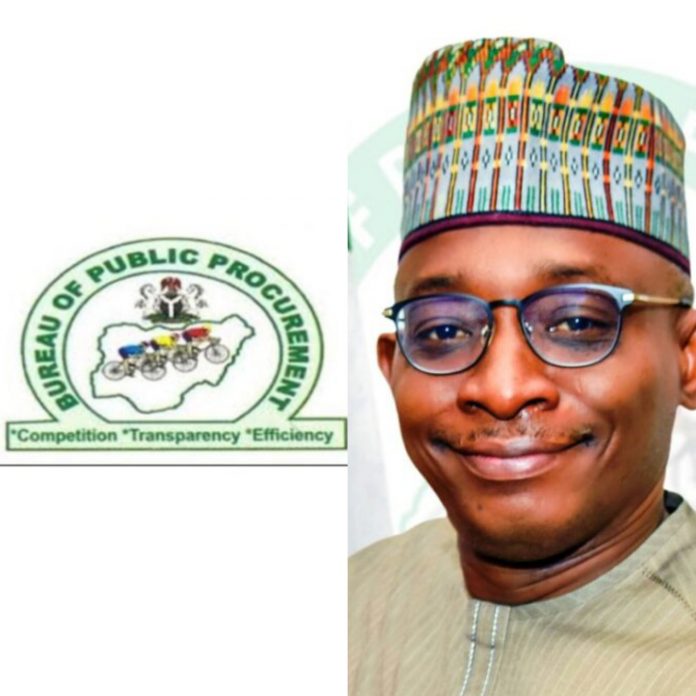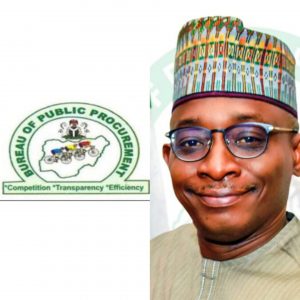••• ‘Resign If The Office Is Too Big For You’ NEFGAD Tells Adedokun
A combined photo of BPP logo and DG BPP, Dr. Adebowale Adedokun
By Abdullahi Abubakar
The Network for Public Procurement Advocacy and Development (NEFGAD) on Tuesday slammed the Bureau of Public Procurement (BPP) for what it described as a “weak and deceptive” defence of the United States’ 2025 Fiscal Transparency Report, which indicted Nigeria for failing to disclose information on public procurement contracts, requesting the BPP’s Director General, Dr. Adebowale Adedokun, to resign If the office ‘is too big for him to handle’
It would be recalled that the U.S. Department of State, in its Fiscal Transparency Report released this month, said Nigeria had made progress in making budget documents and debt obligations publicly available but continued to withhold details of procurement contracts.
It stressed that such a gap undermines accountability and weakens good governance.
The report, which reviewed 139 countries and the Palestinian Authority, found that 71 governments met minimum fiscal transparency requirements while 69 did not. Of the 69, 26 had made significant progress.
Nigeria was listed among 32 African countries still lagging behind, alongside Egypt, Algeria, Libya, Cameroon, Guinea, Liberia, Mali, Niger, Senegal, Sierra Leone, The Gambia, Chad, Angola, Gabon, Zimbabwe, Zambia, Lesotho, São Tomé and Príncipe, Burundi and Tanzania.
The report also indicted the Office of the Auditor-General of the Federation for consistently failing to publish comprehensive budget-execution audits despite having access to the entire executed budget.
It said the supreme audit institution did not meet international standards of independence, and urged Nigeria to strengthen the office, publish audits of executed budgets within 12 months, and make procurement contracts readily accessible to the public.
Other areas highlighted in the report included the need for complete publication of budget documents — executive proposals, enacted budgets, and end-of-year reports — within reasonable timeframes, as well as transparent disclosure of natural resource extraction contracts and licenses.
While reacting to the US Fiscal Transparency Report, the Director-General of the BPP, Dr. Adebowale Adedokun, dismissed the U.S. findings, describing them as outdated and failing to take recent reforms into account.
He said procurement reforms embarked upon under President Bola Tinubu had brought transparency and accountability to the system.
According to him, contracts are now advertised openly, benchmarked for price intelligence, and subjected to monitoring by civil society groups and professional bodies.
He cited examples of foreign firms winning contracts through online bidding without physical presence in Nigeria as proof of openness.
Dr. Adedokun also pointed to decentralisation of procurement processes, higher approval limits for ministries and agencies, procurement audits across the country, and an ongoing transition to electronic government procurement.
He added that contractors now petition the Bureau directly and, in some cases, contract awards have been reversed to correct irregularities.
He stressed that anti-graft agencies including the ICPC, EFCC, Police and Code of Conduct Bureau were investigating and prosecuting procurement violations, while the Bureau was investing in training procurement officers nationwide.
“If in the global space they are saying things have not improved, I have just given you an example of how foreign companies bidded for projects in Nigeria and are executing them without ever stepping into the country,” he argued.
Countering the BPP’s DG’s submission, NEFGAD, in a statement issued in Abuja on Tuesday by its Acting Head of Office, Barr. Unekwu Blessing-Ojo, rejected the BPP’s position, insisting that the U.S. assessment accurately reflected the state of procurement in Nigeria and aligned with its own in-house assessment over the past year.
The group said public procurement under the current leadership of Dr. Adedokun remained “shrouded in secrecy,” with due process frequently ignored, procurement information withheld from the public, and staff morale at the Bureau severely weakened.
It alleged that policy formulations recently issued by the BPP covering local content promotion, civil society participation and improved service delivery amounted to “Artificial Intelligence-generated contents” that lacked any practical impact.
NEFGAD further accused the Bureau of limiting stakeholder engagements to one-off events without meaningful follow-up, thereby failing to build trust or deliver results.
In strong terms, the advocacy body described Dr. Adedokun as “an overrated theorist” who lacks the competence and character to drive reforms or advance the president’s Renewed Hope Agenda.
It advised him to resign if the responsibility of the office was “too big” for him, and urged President Tinubu to appoint a more capable leader.
“The success or failure of any administration depends largely on its public procurement practices,” NEFGAD warned, expressing serious doubt that the current leadership of the Bureau could deliver the level of transparency and accountability urgently required.


